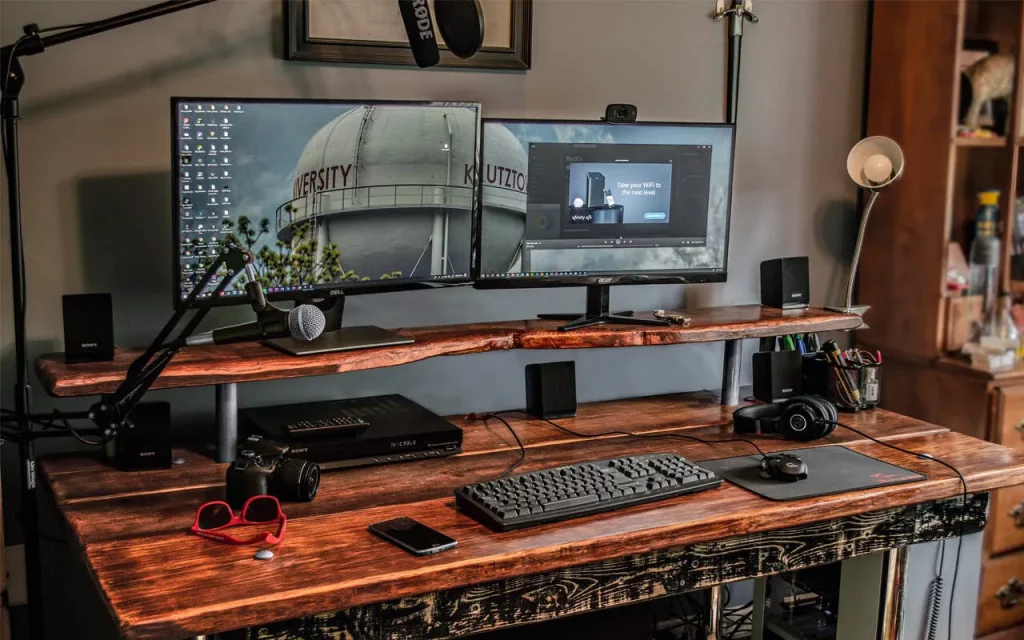When buying gaming accessories, it’s important to focus on features that will enhance your gaming experience, performance, and comfort. Here are the key things to look out for when purchasing gaming accessories:
1. Compatibility
- Why It’s Important: Not all accessories are compatible with every system (PC, console, mobile, etc.).
- Tip: Always check if the accessory is compatible with your gaming platform (PC, PlayStation, Xbox, Nintendo Switch, or mobile).
2. Comfort & Ergonomics
- Why It’s Important: Long gaming sessions can cause strain and discomfort, so ergonomic design is crucial.
- Tip: Look for accessories with ergonomic designs such as:
- Gaming chairs with lumbar and neck support.
- Keyboards with wrist rests.
- Mouse with customizable grips to fit your hand.
- Headsets that are lightweight and cushioned for extended wear.
3. Build Quality & Durability
- Why It’s Important: Gaming accessories often take a lot of wear and tear. Cheaply made products may not last long.
- Tip: Choose accessories made from high-quality materials. Look for durable construction, especially for accessories like keyboards, mouse, and controllers that see frequent use.
4. Performance & Features
- Why It’s Important: Gaming accessories should enhance your gaming performance and experience through additional features.
- Tip: Prioritize the following features:
- Mechanical keyboards with customizable switches for tactile feedback and faster response times.
- Gaming mouse with adjustable DPI and extra buttons for better control in fast-paced games.
- High-fidelity headsets with surround sound or noise cancellation for better audio.
5. Customization & Personalization
- Why It’s Important: Customizable accessories allow you to adapt them to your playstyle and preferences.
- Tip: Look for:
- Programmable buttons on mouse and keyboards for shortcuts.
- RGB lighting for visual customization (also helps with ambiance in a dark room).
- Interchangeable parts such as keycaps or grips for personalization.
6. Wireless vs. Wired
- Why It’s Important: Wireless accessories offer convenience, but may introduce latency; wired ones provide stable performance without input lag.
- Tip:
- For competitive gaming, wired accessories (mouse, keyboards) are generally preferred for minimal latency.
- For casual gaming or a clean setup, wireless accessories with a strong connection (e.g., Bluetooth or 2.4GHz wireless) are ideal.
7. Battery Life (For Wireless Accessories)
- Why It’s Important: Battery life affects how long you can game without interruptions.
- Tip:
- Choose wireless accessories with long battery life or the ability to be used while charging.
- Some devices offer quick charging or replaceable batteries.
8. Audio Quality
- Why It’s Important: Sound is crucial for competitive gaming, helping you hear important cues like footsteps or gunfire.
- Tip: Look for headsets with:
- Surround sound (7.1) or 3D audio for directional accuracy.
- Noise-canceling microphones for clear communication.
- Comfortable ear cups that provide good sound isolation.
9. Price & Value for Money
- Why It’s Important: Accessories can range in price, but higher prices don’t always mean better quality or performance.
- Tip: Set a budget and compare features in different price ranges. Look for sales or discounts, and prioritize value over brand names.
10. Warranty and Support
- Why It’s Important: Gaming accessories can be expensive, and defects or issues may arise.
- Tip: Ensure the product comes with a good warranty (at least 1 year). Check if the manufacturer offers reliable customer support in case of issues.
11. Portability (For Mobile or Console Gaming)
- Why It’s Important: If you’re gaming on the go, you’ll need accessories that are portable and easy to carry.
- Tip: Look for compact, lightweight, and durable accessories. For example, a portable gaming controller for mobile or a travel-friendly headset.
12. Aesthetics & Setup Integration
- Why It’s Important: Gaming accessories are often a big part of your setup’s aesthetics, and they should match or complement your existing gear.
- Tip: Choose accessories that complement the theme of your gaming space. RGB lighting, sleek designs, and coordinated colors can make your setup look cohesive.
13. Latency & Input Lag
- Why It’s Important: Latency can negatively impact your gaming experience, especially in competitive online games.
- Tip: If using wireless peripherals, check reviews for input lag. Wired accessories typically offer the lowest latency.
14. Cooling & Thermal Management
- Why It’s Important: Gaming PCs and consoles generate heat during extended sessions, and accessories like cooling pads or external fans can help maintain performance.
- Tip: Consider investing in cooling solutions like laptop cooling pads, external fans, or even temperature-monitoring gadgets to protect your hardware.
15. Future-Proofing
- Why It’s Important: As technology advances, certain features (like USB-C, higher DPI, or newer wireless protocols) can help ensure your accessories remain relevant longer.
- Tip: Choose accessories that support future standards, such as USB-C connections, higher refresh rates, or expandable functionality.
By focusing on these factors, you’ll be able to pick gaming accessories that offer not just immediate satisfaction but also long-term reliability and performance.

